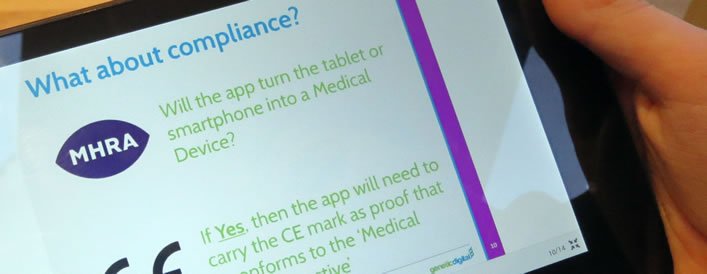When is an app classed as a medical device?
Recently we’ve seen a number of apps with dosage calculator functions, some award winning, released to app stores but surprisingly these don’t seem to carry the CE mark to show that they have been registered with the MHRA as class I medical devices. There are currently over 11,000 medical apps in UK App stores aimed at HCPs which cover a huge number of disciplines from reference guides to dosage calculators. Everyday more and more are being added but how are HCPs supposed to know if the tools they are downloading have been thoroughly tested and are safe to use?
In the UK there is no official requirement to register smartphone or tablet apps either as software or devices with the MHRA and the guidelines that are available are just that, so it depends on what the app does and the level of patient risk associated with it as to whether it should be classified as a device or not.
The European Medical Device Directive MDD 93/42/EEC says:
‘medical device’ means any instrument, apparatus, appliance, material or other article, whether used alone or in combination, including the software necessary for its proper application intended by the manufacturer to be used for human beings for the purpose of:
- diagnosis, prevention, monitoring, treatment or alleviation of disease,
- diagnosis, monitoring, treatment, alleviation of or compensation for an injury or handicap,
- investigation, replacement or modification of the anatomy or of a physiological process,
- control of conception
and which does not achieve its principal intended action in or on the human body by pharmacological, immunological or metabolic means, but which may be assisted in its function by such means;
The inclusion of the word ‘software’ means that potentially all healthcare apps could fall under the medical device banner. However the meeting minutes from the Medical Device Technology Forum in 2010 show that the MHRA will apply further criteria to understand if ‘software’ needs to be categorised as a medical device.
- Electronic Health Records (EHR) – while views apparently differ across Europe, the MHRA believes that if software is purely a record archiving and retrieval system it is unlikely to be considered a medical device. However if it includes a module that interprets data or performs a calculation, then it is likely that this module (or system) may be considered a medical device, depending on the claims of the manufacturer.
- Decision Support software will generally not be considered a medical device if it exists to provide already existing information to enable a healthcare professional to make a clinical decision. However, if it performs a calculation or the software interprets or interpolates data and the healthcare professional does not review the raw data, then this software may be considered a medical device.
Now, common sense must prevail but for example, an app that calculates BMI is highly unlikely to fall within their definition of a medical device, but a dosage calculator which produces a recommended dose based on a patients details, would.
Based on the information available and to ensure patients are not being put at risk, if you are thinking of developing an app that will use patient data to either contribute to, or make a clinical decision then you should submit a registration for the app as a class I device with the MHRA.
Notifying the MHRA
If you want your app to carry the CE mark as proof that it conforms to the Medical Device Directive, you will need to notify the MHRA as soon as it is applied to the device. This process involves producing a declaration of conformity which includes a detailed technical document that proves that the design conforms to the directive. As part of the technical documentation you will also need to have undertaken a controlled test and risk assessment to demonstrate that the app supports and improves upon any existing process used to present the same information. Once all the documentation is in place you can submit your registration with the MHRA and your fee for the registration which currently stands at £70.00.
Ultimately there is no definitive answer as to whether an app should be registered as a device and until such a time as regulation dictates that all apps are registered as medical devices, it’s down to the nature of the app and what it does, applied with common sense that will dictate if an app should carry the CE mark.
What would be interesting however is to understand that if apps carry the CE mark, would they be more likely to be seen as a trusted source by HCPs for use within their professional day?
References: d4.org.uk, mhra.gov.uk

